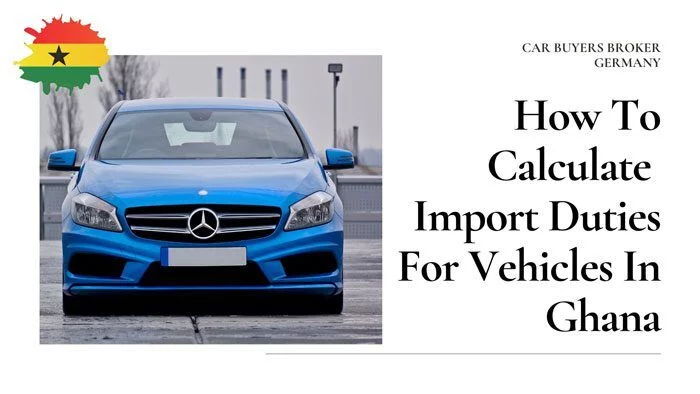Ghana uses the Harmonized System Code to handle imports and exports. The code lists goods coming in or out of the country. According to the regulation, each consignment has a duty payment based on its category, type, size, value, etc. Since the code is public, importers should prepare by checking it beforehand and estimating what amount they will pay. Importation can sometimes be challenging, mainly because of the sheer amount of duties and taxes to pay to get the goods out. But how does one calculate import duty on cars in Ghana?
Cost Insurance and Freight (CIF)

After checking the category of a good, the next step is to calculate its specific duties. All the fees are a percentage of the Cost, Insurance, and Freight (CIF). The CIF is a sum of the cargo value (product price), shipping cost, and sea freight/transport insurance cost.
Import Duty On Cars
The import duty is the most important of all the import charges in Ghana. Depending on the item’s category, the tax to be paid ranges from 5 — 20%. Vehicles generally attract a 20% cost. That is for new cars. Calculating the import duty for used autos is a little more complicated. Import duties for used cars are based on the CIF (Cost, Insurance, and Freight). The cost, however, is calculated differently from that of new vehicles.
Home Delivery Price (HDP)
The depreciation rate (according to their age) is deducted from the Home Delivery Price (HDP) for used vehicles. The sum of the new HDP and handling charges form the ‘Cost’ part of the CIF. The following table shows the depreciation prices for different ages of vehicles:
| -6 months | First purchase price (FPP) |
| 6 months – 1½ years | 85% of FPP |
| 1½ years – 2½ years | 70% of FPP |
| 2½ years – 5 years | 60% of FPP |
| 5 years+ | 50% of FPP |
Note that, for duty purposes, the car’s age is calculated from its manufacture date. Other factors that could influence the import duty include the size of the vehicle and its purpose. If you are unsure of your import duty, you should use an online import duty calculator to determine that.
Overaged Penalty: According to the Ghana Revenue Authority website, vehicles older than ten years attract a penalty as follows:
| Private Motor Vehicles | Commercial Vehicles(Bus Coach or Van) | Commercial Vehicles(Trucks and Lorries) |
|---|---|---|
| -10 years: NIL | -10 years: NIL | -10 years: NIL |
| 10 – 12 years: 5% of CIF | 10 -12 years: 2.5% of CIF | 10 -12 years: 5% of CIF |
| 12 – 15 years: 20% of CIF | 12 – 15 years: 10% of CIF | 12 – 22 years: 10% of CIF |
| 15 – 25 years: 50% of CIF | 15 – 20 years: 20% of CIF | 22 years+: 30% of CIF |
| 25 – 35 years: 70% of CIF | 20 – 25 years: 50% of CIF | |
| 35 years+: 100% of CIF |
Other Charges
These charges apply across the board.
- Value Added Tax (VAT): 12.5%.
- National Health Insurance Levy (NHIL): 2.5%
- GET FUND Levy: 2.5%
- AU Levy: 0.2%
- ECOWAS Levy: 0.5%
- Exim. Levy: 0.75%
- Examination Fee: 1%
- Special Import Levy: 2%
Import Duty On Cars In Ghana – Experiences
Watch The Video Here
By calculating the levies together, a car could cost up to 47.45% in duty charges before entering the country. For all other taxes apart from the import duty, the rates are the same for both used and new vehicles.
Importation is usually very stressful, but you can save yourself the stress by finding a good shipping company that would handle it all for you. Keep in mind that they also would want their cut of your money.
Side Note:
Before importing a car, even after estimating the cost, ensure you have extra money when it is your first time. You cannot tell how much to pay if you do your homework incorrectly. Many people only consider the price of the vehicles and shipping costs but ignore checking the levies. Do not make this mistake.
I want to inform you that importing a car from Germany is trendy now in our network, as is buying a vehicle with original mileage. Do you want to know more about the topic? Just click here → Why do Original Low Mileage Vehicles Affect Buyer’s Decisions?
Key Learnings
Do note that once your vehicle gets to the port in Ghana, you must clear it within 60 days. Otherwise, you would risk forfeiture to the state. Finally, gathering much information before importation is essential, especially if you have not shipped anything into the country. Of course, it is filled with bureaucracies, but if you know the regulations and duties ahead, you will not find it as difficult as it is for many people.
But remember that it is always best to consult a professional customs clearing agency at the port where you want to clear your vehicle from customs. Doing so will give you a quote and proper insight into duty and other charges to pay before choosing an agent. “Do It Yourself” works only when you know what you are doing correctly.
Do you want to get the best deals on a vehicle from a car broker? Check out → 6 Quick Tips For Choosing A Car-Buying Service.
